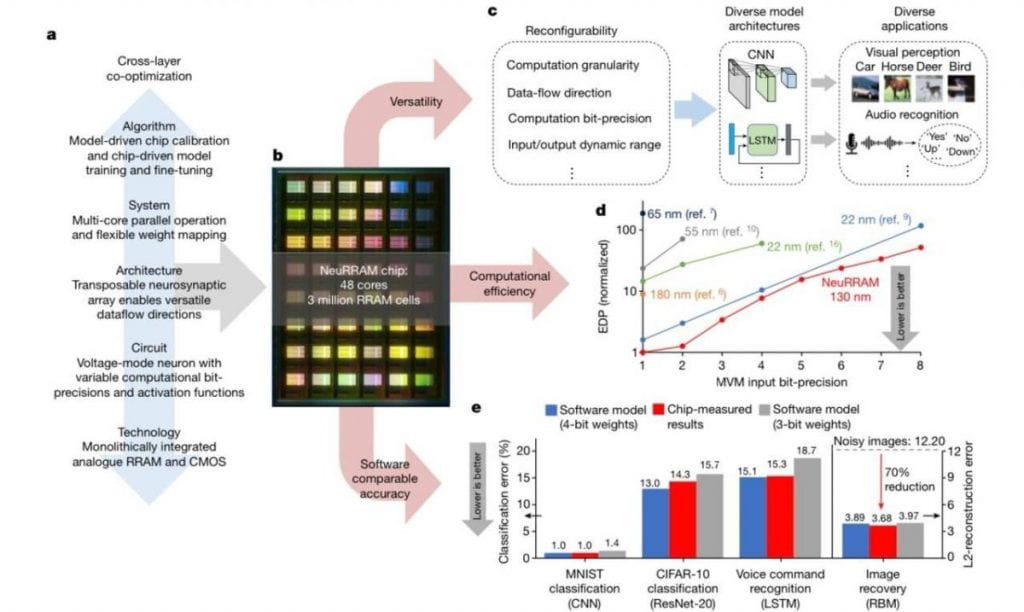NeuRRAM: Researchers Developed the Most Advanced Neuromorphic Chips for AI Tasks

In Brief
NeuRRAM is a game changer in the field of neuromorphic computing due to its lower energy consumption and greater accuracy for complex AI tasks.
It uses analog memory to store and process large data and can support a diverse range of AI tasks with high accuracy.
Researchers have developed the most advanced neuromorphic chips to date – NeuRRAM. These chips have numerous advantages compared to traditional computing methods, including lower energy consumption and greater accuracy for complex AI tasks. As a result, these chips have the potential to revolutionize the field of computing and the development of AI.

NeuRRAM is a game changer in the field of neuromorphic computing for several reasons. For starters, it uses analog memory to store and process large data, providing more efficient operation than traditional computing methods. Furthermore, NeuRRAM is capable of supporting a diverse range of AI tasks with high accuracy, including image recognition to voice command recognition.

One of the main advantages of NeuRRAM is its energy efficiency. Unlike traditional computers, NeuRRAM chips can save up to 1,000 times more energy while still providing the same level of accuracy. It achieves this with the lack of energy-intensive data movement during usage, as weight modeling and calculations are all done directly on the chip. Moreover, the chip also supports data parallelism, allowing one layer in the neural network model to be mapped to multiple cores for parallel inference.
These advantages have enabled NeuRRAM chips to be used in various contexts, from everyday wearables to virtual reality systems. As a result, NeuRRAM chips have the potential to dramatically expand the possibilities for AI and computing by providing performance superior to that of more traditional methods. In essence, the researchers behind NeuRRAM have made a great step forward in the field of artificial intelligence.
Read more about AI:
Disclaimer
In line with the Trust Project guidelines, please note that the information provided on this page is not intended to be and should not be interpreted as legal, tax, investment, financial, or any other form of advice. It is important to only invest what you can afford to lose and to seek independent financial advice if you have any doubts. For further information, we suggest referring to the terms and conditions as well as the help and support pages provided by the issuer or advertiser. MetaversePost is committed to accurate, unbiased reporting, but market conditions are subject to change without notice.
About The Author
Damir is the team leader, product manager, and editor at Metaverse Post, covering topics such as AI/ML, AGI, LLMs, Metaverse, and Web3-related fields. His articles attract a massive audience of over a million users every month. He appears to be an expert with 10 years of experience in SEO and digital marketing. Damir has been mentioned in Mashable, Wired, Cointelegraph, The New Yorker, Inside.com, Entrepreneur, BeInCrypto, and other publications. He travels between the UAE, Turkey, Russia, and the CIS as a digital nomad. Damir earned a bachelor's degree in physics, which he believes has given him the critical thinking skills needed to be successful in the ever-changing landscape of the internet.
More articles

Damir is the team leader, product manager, and editor at Metaverse Post, covering topics such as AI/ML, AGI, LLMs, Metaverse, and Web3-related fields. His articles attract a massive audience of over a million users every month. He appears to be an expert with 10 years of experience in SEO and digital marketing. Damir has been mentioned in Mashable, Wired, Cointelegraph, The New Yorker, Inside.com, Entrepreneur, BeInCrypto, and other publications. He travels between the UAE, Turkey, Russia, and the CIS as a digital nomad. Damir earned a bachelor's degree in physics, which he believes has given him the critical thinking skills needed to be successful in the ever-changing landscape of the internet.



















































